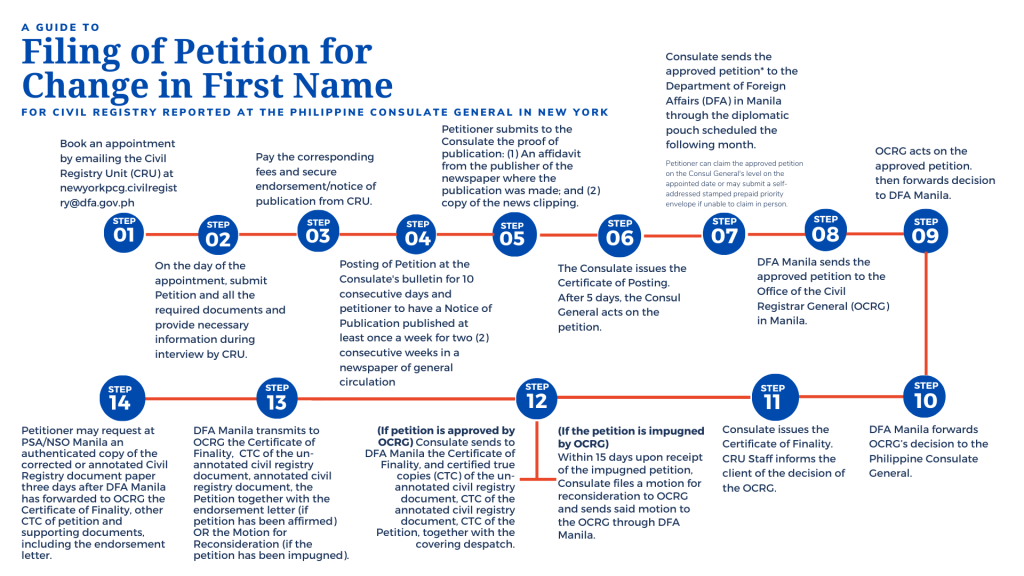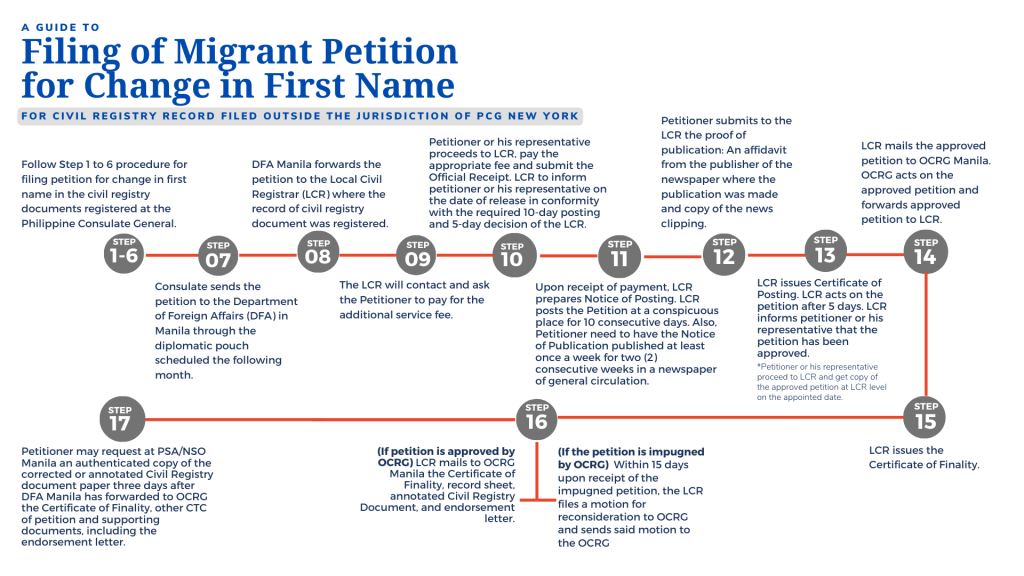CHANGE OF FIRST NAME OR NICK NAME
Under Republic Act 9048 as amended by Republic Act 10172, Filipinos abroad may file a petition before the Philippine Consulate General in New York to cause a Change of First Name or Nickname in the Civil Register without a need of a judicial order, subject to certain conditions.
These conditions are as follows:
- The petitioner finds the first name or nickname to be ridiculous, tainted with dishonor or extremely difficult to write or pronounce;
- The new first name or nickname has been habitually and continuously used by the petitioner and he has been publicly known by that first name or nickname in the community; or
- The change will avoid confusion.
The petition may be filed by a person of legal age who must have a direct and personal interest in the change of first name in the civil register, such as the:
- Owner of the record that contains the error to be corrected or first name to be changed
- Owner’s spouse, children, parents, brothers, sisters, grandparents, guardian, or any other person duly authorized by law or by the owner of the document sought to be corrected.
A person is considered of legal age when he is eighteen years old and above. Thus, a minor (less than eighteen years old) cannot by himself file a petition.
The general rule is that petition shall be filed with the Local Civil Registry Office (LCRO) where the record containing the first name to be changed is kept. Included in this general rule is the case of the Office of the Clerk of Shari’a Court where records of divorces, revocations of divorces, conversions to Islam are kept and where some Muslim marriages are registered.
However, in case the petitioner is a migrant within or outside the Philippines, meaning his present residence or domicile is different from where his civil registry record or records are registered, he may file the petition in the nearest LCRO in his area or Philippine Consulate General if abroad. His petition will be treated as a migrant petition.
The C/MCR and the District/Circuit Registrar (D/CR) are authorized to collect from every petitioner Three Thousand Pesos (P3,000.00) for the change of first name.
In the case of a petition filed with the Consul General (CG), the fee is One Hundred Fifty US dollars ($150.00) for the change of first name. The said fee is the same for all Philippine Consulates.
A migrant petitioner shall pay an additional service fee of One Thousand Pesos (P1,000.00) for change of first name to the Petition Receiving Civil Registrar (PRCR). This service fee shall accrue to the local treasury of the PRCR.
Basic Requirements to File Petition for Change of First Name or Nickname
Petition is in the prescribed form of an AFFIDAVIT that:
- Must be subscribed and sworn to before any person authorized by law to administer oath;
- Set forth facts necessary to establish the merits of the petition;
- Show affirmatively that the petitioner is competent to testify to the matters stated; and
- State the particular first name sought to be changed and the change to be made.
Petition must be supported with the following documents:
- A certified true machine copy of the certificate or of the page of the registry book containing the entry or entries sought to be changed;
- At least two (2) public or private documents showing the correct entry or entries upon which the change shall be based;
- Notice or certification of posting;
- A clearance or a certification that the owner of the document has no pending administrative, civil or criminal case, or no criminal record, which shall be obtained from the following:
- Employer, if employed
- National Bureau of Investigation
- Philippine National Police
- Affidavit of Publication from the publisher and a copy of the newspaper clipping; and
- Other documents which the petitioner or the Consul General may consider relevant and necessary for the approval of the petition.
Civil Registry FAQ
Currently, e-Census (online service of the National Statistics Office) is not able to accept requests for civil registry documents that have undergone correction and/or changes in entries through legal means allowed by Philippine laws. Documents that fall under this category of court decrees and legal instruments (CDLIs) include, but are not limited to:
- Supplemental reports;
- Legitimation;
- Adoption;
- Presumptive death;
- Annulment of Marriage; and
- Civil Registry of records whose entries have been corrected and/or changed through RA 9048 (Clerical Error Law); and RA 9255 (An Act Allowing Illegitimate Children to Use the Surname of the Father)
For cases under this category, the submission of copies of supporting documents is required. To apply for a copy of your corrected document, you must forward your request directly to the PSA. Submit your intention to apply for a copy of your corrected/annotated birth certificate to: L.Hufana@census.gov.ph.
Please be advised that you will be required to submit additional documents pertinent to your request, when requesting these documents for the first time. For succeeding requests for a copy, indicate in your request that the document you are getting is affected by supplemental report, court decree or legal instruments, or that it underwent changes/corrections provided for under RA 9048 or RA 9255. If you are applying via the e-Census website, please e-mail the NSO directly at: e-census.info@mail.census.gov.ph
In order to supply the missing entry in your birth record, you have to file an application for a Supplemental Report at the Local Civil Registry Office (LCRO), where your birth was registered.
You must bring supporting documents, e.g., baptismal certificate, school records, etc., as these may be required in filing the application. The LCRO will then submit a copy of the Supplemental Report to NSO, along with the civil registry documents they regularly transmit to the agency.
This procedure also applies for birth records with “Baby Boy” or “Baby Girl” written as the first name for births that occurred until 1992. For the years thereafter, 1993 to the current year, correction must be done through RA 9048 (Clerical Error Law).
For those whose births were recorded by the Philippine Consulate General New York, please click here for the link on Supplemental Report on Civil Registry Documents.
For schools under the auspices of the Philippine Commission on Higher Education (CHED), corrections on the transcript as far as spelling of the name and the place of birth can be made through the CHED. The list of requirements is as follows:
- Letter-Request addressed to: The Regional Director, Commission on Higher Education, Region _____, Address
- Certified TRUE Copy of Certificate of Live Birth
- Notarized Original Copy and Photocopy of (a)Personal affidavit, and (b) Joint Affidavit of Two (2) Disinterested Persons, i.e. HINDI KAMAG-ANAK (NOTE: Affidavits expire six (6) months after)
- Photocopy of Marriage Contract (Married Women ONLY)
- Endorsement Letter from College Registrar (Incoming College Freshman ONLY)
- Photocopy of Transcript of Records and/or Diploma (if Available)
- Photocopy of any VALID ID CARD with Picture (i.e. Passport, PRC License, Office ID, School ID, etc.)
- Processing fee P 40.00 (Payment Upon Release) or POSTAL MONEY ORDER of P 40.00 and Self Addressed Stamped Envelope if Processing is to be by POSTAL MAIL.
Processing Period: Approximately seven (7) working days
For further information, contact:
Legal Affairs Service
Phone: 6373570 or 6367637
Emaill: las@ched.gov.ph
NOTE: Some universities, such as the University of the Philippines, have their own charter and are not under the auspices of the CHED. In such cases, contact the Registrar’s Office of your university for proper guidance.
Republic Act (RA) 9048, as amended authorizes the City or Municipal Civil Registrar or the Consul General to correct certain clerical or typographical errors in an entry in the civil register without need of a judicial order.
President Gloria Macapagal-Arroyo approved the R.A. 9048 on 22 March 2001. With the law taking effect on 22 April 2001, the Civil Registrar-General promulgated Administrative Order No. 1 Series of 2001, which was published in the newspaper in August that year.
Eleven years thereafter, Republic Act No. 10172 was enacted into law, expanding the list of clerical or typographical errors under R.A. 9048 that may be corrected without a judicial order. This was followed by Administrative Order No. 1, Series of 2012 of the Civil Registrar General, which is the Implementing Rules and Regulations of the said R.A. 10172.



